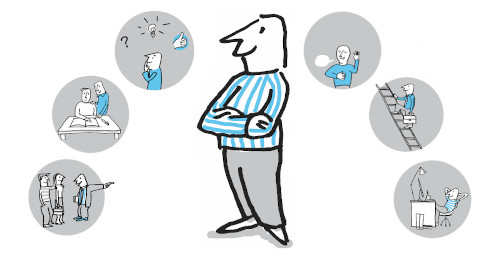What are the competencies of entrepreneurs? Which entrepreneurial competences can we all distinguish and which competencies fit which type of entrepreneur?
It turns out that we can distinguish between 6 entrepreneurial competencies. You can read what these entail below. Can't wait and are you curious about what kind of entrepreneur you are? Please feel free to take our entrepreneurship test.

It is possible to distinguish six entrepreneurial competencies. These are: resourceful, cooperative, creative, responsible, persevering and confident. These are so-called soft skills. Soft skills are skills that you possess naturally and that suit your personality. Below are the six most important entrepreneurial competencies.
 The term resourceful means that entrepreneurs often like to take action and naturally take charge. An entrepreneur who is resourceful, has a clear opinion and is happy to share it, is persuasive and approaches people easily.
The term resourceful means that entrepreneurs often like to take action and naturally take charge. An entrepreneur who is resourceful, has a clear opinion and is happy to share it, is persuasive and approaches people easily.
 Cooperative means that entrepreneurs often get along well with other people. Many entrepreneurs understand that successful teamwork depends on others in order to achieve a common goal. An entrepreneur with this soft skill is usually caring, friendly, subtle in their approach, helps others and works really well with others.
Cooperative means that entrepreneurs often get along well with other people. Many entrepreneurs understand that successful teamwork depends on others in order to achieve a common goal. An entrepreneur with this soft skill is usually caring, friendly, subtle in their approach, helps others and works really well with others.
 Creative refers to the notion that entrepreneurs are often full of innovative and unique ideas. An entrepreneur with this soft skills has broad interests, thinks out-of-the-box, comes up with solutions to problems and is often artistic.
Creative refers to the notion that entrepreneurs are often full of innovative and unique ideas. An entrepreneur with this soft skills has broad interests, thinks out-of-the-box, comes up with solutions to problems and is often artistic.
 Responsible means that entrepreneurs understand that tasks or duties must be completed properly. An entrepreneur with this competency sticks to established agreements, is a perfectionist, always arrives on time and is tidy and well-organised.
Responsible means that entrepreneurs understand that tasks or duties must be completed properly. An entrepreneur with this competency sticks to established agreements, is a perfectionist, always arrives on time and is tidy and well-organised.
 Perseverance means that many entrepreneurs are determined and steadfast. An entrepreneur with this soft skill generally has a clear goal in mind and doesn't give up until this goal is achieved. These entrepreneurs often set high standards for themselves and others and go for quality.
Perseverance means that many entrepreneurs are determined and steadfast. An entrepreneur with this soft skill generally has a clear goal in mind and doesn't give up until this goal is achieved. These entrepreneurs often set high standards for themselves and others and go for quality.
 Self-confident means that the entrepreneur knows exactly what they excel at. Entrepreneurs with this soft skill are well aware of their own areas of improvement and shortcomings. In addition, they often have courage and can generally cope well with (financial) uncertainty and setbacks.
Self-confident means that the entrepreneur knows exactly what they excel at. Entrepreneurs with this soft skill are well aware of their own areas of improvement and shortcomings. In addition, they often have courage and can generally cope well with (financial) uncertainty and setbacks.
Below are three types of entrepreneurs; the classic entrepreneur, the franchisee and the independent entrepreneur. Which competencies best suit which type of entrepreneur?
This is the typical example of an entrepreneur. The classic entrepreneur is literally someone who starts their own business They come up with a good idea and start with nothing. They are especially creative, because they recognise opportunities everywhere and think up new products and services. The type of entrepreneur‘s skills may vary a lot, partly depending on the entrepreneur’s score on the other competencies.
A franchisee has their own company, where they have the right to use a certain brand name. For example a McDonald's branch. Holding this right also involves agreements about the products you are allowed to sell and under which conditions. As a franchisee, you are therefore not the type of entrepreneur who comes up with a new product or service, but instead you must be responsible, persevering and be able to work well together with different parties.
The independent entrepreneur is a collective name for many types of entrepreneurs. From a self-employed person without staff to a business owner with a lot of staff. For example, think of a farmer, private chef, beach tent owner, catering entrepreneur, independent baker or independent florist. Every independent entrepreneur has a different approach. For instance, there are entrepreneurs who are driven by profit maximisation (often persevering types) and entrepreneurs who are innovative and are always looking for ways to distinguish themselves (often highly creative).